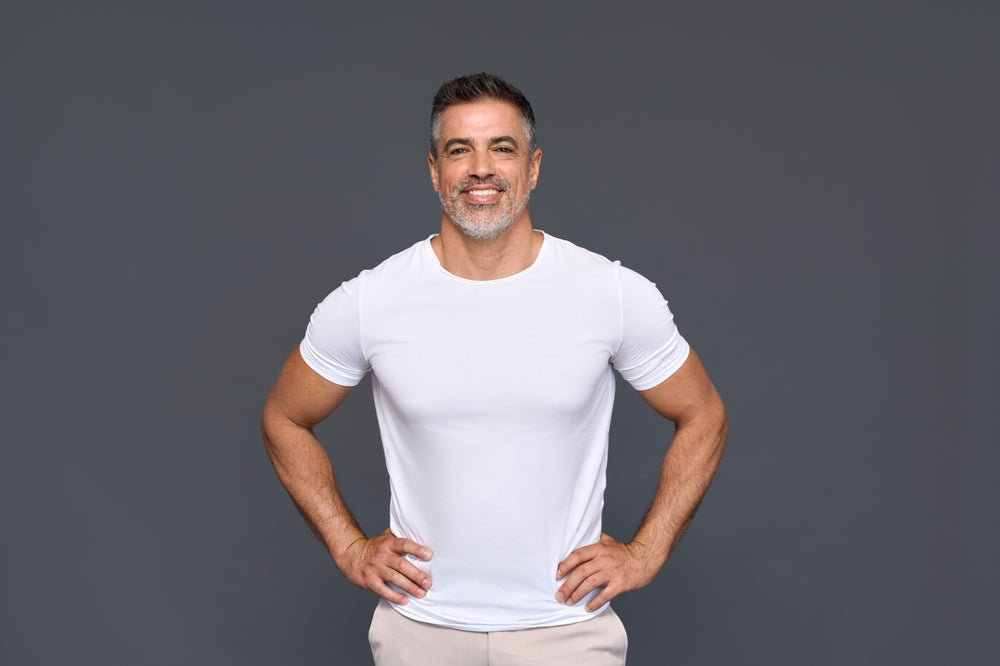Chronological age in the fitness industry does not determine one’s ability to guide others in their physical health goals.
According to the Financial Times , there has been an increasing demand for older personal trainers in the past 5 years, suggesting a welcoming workforce for experienced individuals.
Furthermore, the International Health, Racquet & Sportsclub Association (IHRSA) highlights a trend towards age diversity with successful personal trainers operating well into their 50s and beyond. ( source )
Older adults often seek trainers who understand their unique fitness needs and offer tailored empathetic guidance. As life expectancy increases, so does the market for fitness professionals adept at serving this growing segment.
Physical Fitness at Any Age: A Personal Trainer's Asset
A commitment to personal fitness is a universal asset for personal trainers, transcending age. By maintaining an exemplary fitness level, trainers exemplify the lifelong benefits of regular exercise. This commitment not only enhances a trainer's health and stamina but also serves as a potent advertising tool.
The authenticity of a fit personal trainer resonates with potential clients, often translating into trust and motivation.
An optimal level of personal fitness shapes a trainer's image, showcasing their expertise and passion for the lifestyle they promote.
Overcoming Age-Related Stereotypes in the Fitness Industry
Like many others, the fitness industry is not alone in experiencing stereotypes, especially regarding age. Trainers with more life experience may encounter beliefs that agility, stamina, or the ability to connect with a younger clientele are not up to par with their younger counterparts.
Tackling these stereotypes begins with recognising them. Older trainers could be seen as not being in touch with current fitness trends or lacking the physical prowess required for demonstrating complex exercises. Once identified, these misconceptions become opportunities for education and dispelling myths.
Techniques for Showcasing Your Strengths
Older trainers have unique strengths to highlight. Leveraging personal life experiences can foster deeper connections with clients.
Active listening skills, patience, and a broad understanding of various life stages offer a holistic approach to personal training that extends beyond physical fitness.
Effectively communicating and demonstrating these skills becomes a powerful method for debunking age-related myths in the fitness industry.
Cultivating an atmosphere of trust with clients reassures them of your expertise and commitment. It may be beneficial to obtain specialized certifications, or to emphasise the relevance of your experience to the client's goals.
Older Trainers Breaking the Mold
Consider the story of a trainer who began their fitness career at 60, utilising her background in healthcare to enhance her training methodology. She overcomes preconceived notions by prioritising her own fitness, consistently updating her certifications and staying abreast of industry advancements.
Her success is measured not just in personal achievements, but in satisfied clients of all ages who trust and value her expertise.

Another narrative might revolve around a personal trainer who chose to specialise in senior fitness, understanding the nuances of ageing and how to adapt fitness for longevity, thereby filling a niche market and breaking age-related barriers.
- Identify prevalent stereotypes in the fitness industry.
- Use personal experiences and success stories as evidence of capability.
- Stay updated on the latest fitness trends and training methods.
- Acquire and highlight personal training certifications that bolster one’s fitness education and specialisation.
- Focus on building rapport with clients to showcase interpersonal skills that dispel age-related myths.
Certifications and Education for Aspiring Older Trainers
Achieving personal training certification from a reputable organisation is non-negotiable for anyone entering this profession. These certifications validate your knowledge, skills, and commitment to the craft of personal training.
Analyse available certification programs and select one that resonates with your training philosophy and career goals.
Advancing your expertise with continuing education and speciality certifications is a strategy to stand out. This may entail enrolling in courses related to nutrition, gerontology, or sports psychology. It caters to specific niches within the diverse clientele you will encounter and empowers you to offer tailored training programs.
Lifelong learning imbues you with a competitive edge, signalling your dedication to adaptability and growth. Embrace educational opportunities that not only enhance your credentials but also expand your understanding of health and fitness trends.
- Examine certification prerequisites to ensure they align with your professional objectives.
- Invest in specialized training for areas such as functional fitness for seniors or youth athletic development, if these are target demographics.
- Integrate educational pursuits into your career development plan, understanding that these commitments reinforce your expertise.
Networking and Building Clientele as an Older Trainer
By attending industry conferences and joining professional associations, mature trainers can tap into a wealth of resources that aid in career advancement.
The expertise and life experiences older trainers possess become their social currency, enabling them to engage with peers and potential clients on a more profound level.
Effective Networking Strategies for Older Trainers
Determining the focal points for networking may require starting with local health clubs, where familiarity breeds trust, and word-of-mouth spreads quickly. Participation in fitness challenges or wellness programs amplifies visibility among potential clients.
Additionally, mentoring younger trainers can establish credibility and foster reciprocal relationships, wherein fresh talents also refer clients who may prefer a trainer with more life experience.
Leveraging Social Media and Local Events to Build Your Brand
Creating a professional online presence utilizing social media platforms like Instagram, Facebook, and LinkedIn allows for showcasing expertise and attracting a diverse client base.
Older trainers can share insights, workout tips, and motivational stories that resonate with individuals of all ages. Hosting or participating in local charity runs, health fairs, and wellness workshops not only enhances brand visibility but also directly connects trainers with the community they serve.
Collaboration and Partnerships with Health and Wellness Professionals
Forming alliances with nutritionists, physiotherapists, and other personal trainers can result in mutual referrals, creating a more extensive network of professionals and clients.
These partnerships often extend beyond mere business transactions to becoming a united front in advocating for healthier lifestyles. Each successful collaboration amplifies the older trainer's reputation, facilitating a larger client base that values comprehensive, interprofessional approaches to health and fitness.
The Journey of Mature Personal Trainers
Entering the personal training profession may seem daunting for those embarking on this path later in life. Nevertheless, mature trainers frequently bring a wealth of experience and a unique perspective that resonates with clients of all ages. They showcase that life skills and varied experiences contribute significantly to their ability to motivate and connect with others.
By obtaining the necessary certifications and education in personal training , older individuals set the stage for a thriving career in fitness training. They leverage their age as a testament to living an active lifestyle, influencing others to prioritize health at any stage of life.
Marketing strategies harness the power of storytelling and authenticity, enabling older trainers to attract clients who appreciate the depth of their life experience. Mature trainers often attract a diverse clientele, from young adults to seniors, all seeking a relatable figure who can offer more than just fitness advice.
Contrary to the assumptions about age, the fitness industry often celebrates diversity, including age diversity. Older personal trainers are not only welcomed but embraced for their unique insights and the authenticity they bring to their practice.
Their representation in gyms, health clubs, and private practices nationwide reaffirms the notion that personal training is not reserved for any single age group but is an inclusive and adaptable profession.
- Experience often translates into relatability and trust from clients.
- Relevant certifications showcase commitment and expertise.
- Authentic marketing connects with a broader audience.
- Networking solidifies a foundation for clientele growth.
- The fitness community values inclusivity, including age.







